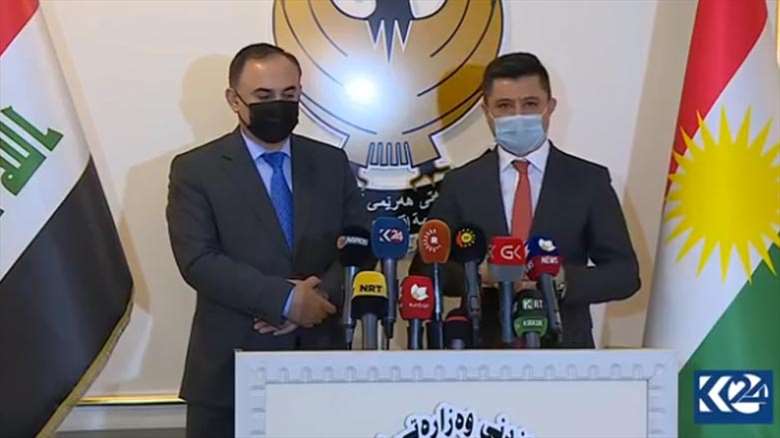Kurdistan responds to ‘Arabization’ in disputed areas, “What is going on there cannot be tolerated”
Minister of the Region for Negotiations with Baghdad Khalid Shwani, on Monday, said that acting governor of Kirkuk, Rakan Al-Jabouri, bears responsibility for the Arabization movement in Kirkuk, stressing that the implementation of Article 140 is the solution for the disputed areas.

ERBIL (Kurdistan 24) – The Minister of the Kurdistan Region for Negotiations with Baghdad, Khalid Shwani, charged on Monday that the acting governor of Kirkuk, Rakan Al-Jabouri, bears responsibility for the Arabization movement in Kirkuk.
Shwani stressed that implementing Article 140 of Iraq’s 2005 constitution is, instead, the solution for the disputed areas.
In a joint press conference with Abdul Hakim Khasro, head of the Coordination and Follow-up Department in the Council of Ministers, Shwani explained, ”The High Committee for dealing with the issue of the disputed areas will put its recommendations before the regional government and start talks with Baghdad,” as he affirmed, “It is no longer possible to remain silent on what is happening in the disputed areas, where there are constant attacks on the Kurds."
"The process of Arabization is ongoing, and the situation cannot continue as it is now,” Shwani said. “The regional government’s approach is to address the problems according to the law and to revive Article 140 of the constitution.”
“These areas cannot be abandoned, and we will intensify our efforts during the coming period,” he affirmed.
For his part, Abdul Hakim stated, "The Kurdish areas outside the region are important, and that is why the regional government always stresses the need to address the problems of these areas, among the other outstanding files between Erbil and Baghdad.”
According to Article 140, the fate of the territories in dispute between Erbil and Baghdad requires a referendum to be held in the contested areas in order to allow people to decide whether they want to be governed by the Kurdistan Regional Government (KRG) or the Iraqi federal government. However, although the deadline for the vote passed over a decade ago, no such referendum has taken place.
“The acting governor of Kirkuk, Rakan al-Jabouri, plays a major role in the process of Arabization,” Shwani charged.
“He brings Arabs from other cities in Iraq to Kirkuk to occupy Kurdish homes and lands,” Shwani continued, and “there are judges in Kirkuk who issue judicial orders in favor of Arabs who practice the process of Arabization in Kirkuk."
Last Tuesday, residents of a village in the disputed province of Kirkuk warned that they are preparing for the worst-case scenario, after repeated attempts by Iraqis from other cities who are ethnically Arab to seize their properties.
Read More: Kurdish residents of disputed Kirkuk village say new 'Arabization' underway
"The committee concerned with the security, military, and administrative situations in the disputed territories held its meeting today, and the committee will present its recommendations to the regional government," Shwani added, as he noted that “since 2017, 61 Kurdish officials have been changed and removed, and this is a clear indication of a demographic change in Kirkuk.”
Kirkuk and other disputed areas were subject to large-scale demographic change under the regime of Saddam Hussein, in favor of Arabs at the expense of Kurds and Turkmen. The former regime expelled Kurdish and Turkmen citizens from their homes and agricultural lands and gave them to Arabs, who were brought in from other provinces.
Following the US-led overthrow of the dictatorial regime in 2003, many Kurdish citizens returned to their homes and lands, according to Article 140.
Iraqi forces have been in charge of Kirkuk and other disputed territories since October 2017, when they and militias from the Popular Mobilization Forces (PMF), in a military operation directed by the late Qasim Soleimani, head of the Quds Force of Iran’s Islamic Revolutionary Guard Corps, drove Peshmerga from the province following the Kurdistan Region's independence referendum in September.
Since then, Kurdish residents of the disputed territories have complained on multiple occasions about pressure from Arab Iraqis to abandon their homes and other property.
Editing by Laurie Mylroie